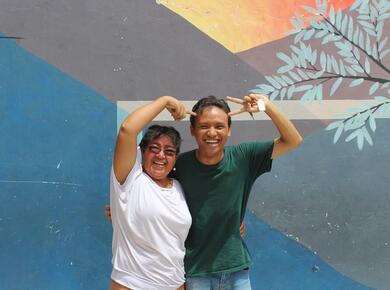Posted: April 13, 2023
What do cooking and graphic design have in common? For Adi Nugroho, it’s never been about mastering either of these skills. Technical skills are simply the backdrop for developing emotional tools and creating a space for connection, even across cultures.
When Adi’s host mom, Angela Opimi, was asked if she’d like to open her home up to a participant of the YAMEN (Young Anabaptist Mennonite Exchange Network) program, she was reluctant at first. Angela has been connected to the Mennonite church for years, and she now acts as vice president of Iglesia Evangélica Menonita Boliviana (IEMB) and is a member of Mennonite World Conference’s Deacons Commission. But despite those strong church ties, having someone live in her home felt like a big step. Her biggest fear in hosting? Preparing food.
She remembers telling Adi Nugroho about her fears around cooking when he first arrived. He assured her that, “as long as there’s rice to cook, I’ll be fine.”
To Angela Opimi’s surprise, the kitchen has become a place where they’ve built a friendship, shared jokes, and for Adi Nugruho, learned a new language. In the beginning, he didn’t know any Spanish, so the words they had to communicate were limited. But in the kitchen, his relationship with his host mom and his comfort in Spanish grew.
When Adi Nugroho heard about YAMEN, a one-year service term for young adults outside of Canada and the U.S. that provides the chance to learn, serve and grow in another country, he knew that going to Bolivia would be different than his home country in Indonesia.
YAMEN is a joint program of Mennonite Central Committee (MCC) and Mennonite World Conference (MWC).
Adi Nugroho arrived in Bolivia with an openness to see how his experience in graphic design could be used at Talita Cumi, a home for orphaned and at-risk children and youth. Talita Cumi is supported by two churches Restoration Church and Trinity Church, which help provide spiritual support and activities for children.
For traumatized youth, qualities like time management, patience and teamwork have often taken a back seat to other family priorities. After a few months of building relationships with the children, Adi realized that while teaching a hard skill like graphic design would be fun, it could also be an opportunity to teach emotional development in an indirect way.
Adi Nugroho uses the example of developing confidence; he explains that many children don’t have much confidence in their abilities. Children might draw something in his class but would quickly scribble on top of it if anyone looked at it. But once they see their own posters hung in the halls of Talita Cumi they think, “wow this is my project!” It builds confidence. They might think “oh, maybe I can do more.” They can picture a future for themselves that they couldn’t imagine before.
His experience with YAMEN has pushed Adi Nugroho to practice the emotional skills he’s teaching.
“When I first came here everything was hard, the culture was difficult to adapt to, and the language made everything harder.” Rice, a staple food in Indonesia, was prepared differently in Bolivia. But after a long day, Adi Nugroho and Angela Opimi would meet in the kitchen to cook a simple meal. He shared some of his favorite recipes from Indonesia and she shared easy Bolivian dishes.
While he’s building skills while cooking with Angela Opimi, Adi Nugroho is also expanding his ideas about how food can be prepared and building a relationship along the way.
Angela Opimi says, “I enjoy spending time with him in the kitchen because he doesn’t just wait for food to appear. He says, ‘let’s make it together and we can make it faster’. I’ve remained an independent person, but he’s not a stranger in my home, he’s more like a nephew.”
Maybe Adi Nugroho and Angela Opimi won’t become master chefs. Maybe the children at Talita Cumi won’t want to continue in a career with graphic design. But the emotional tools that they carry with them as they interact with other people and cultures, will last a lifetime.
—A Mennonite World Conference and Mennonite Central Committee joint release by Rachel Watson, communications and program support facilitator for Mennonite Central Committee in Bolivia.
YAMEN 2022-2023 Participants
| Name | Country of origin | Country of placement | Member church *indicates MWC member church |
|---|---|---|---|
| Emilia Macono Guzman | Bolivia | México | Sinai Evangelical Mennonite Church (IEMB) * |
| Uziel Zambrana Hurtado | Bolivia | Colombia | Smyrna Evangelical Mennonite Church* |
| Sina Dy | Cambodia | Kenya | Community of Changed Hearts Church |
| Sokvoleak Chum | Cambodia | Uganda | Tumnup Tek Khmer Evangelical Church |
| Sovanich Chhoun | Cambodia | Nicaragua | Nation Church Phnom Penh |
| Lilibeth Guzman Macea | Colombia | Honduras | Communidad Menonita Nueva Vida en Cristo Jesus |
| Nidia Marleny Linares Martinez | El Salvador | México | Mennonite Evangelical Church of El Salvador* |
| Esther Abigail Aguilar Velasquez | Honduras | Bolivia | Iglesia Evangélica Menonita de Santa Rosa de Copan |
| Eve Franklin | India | Kenya | Mennonite Church Durg (MCI, Dhamtari)* |
| Mahima Tandi | India | Uganda | Bethlehem Mennonite Church Memra Pithora (BGCMC)* |
| Shepher Sona | India | Cambodia | Hebron Mennonite Church (BGCMC)* |
| Cahya Putri Wulansari | Indonesia | Rwanda | GITJ Kelet* |
| Johana Christianti | Indonesia | Burkina Faso | GKMI Bogor* |
| Setyawan “Adi” Nugroho | Indonesia | Bolivia | GKMI Kudus* |
| Rael Kiptoo | Kenya | Uganda | Shalom Mennonite Church |
| Sarah Pariken | Kenya | Cambodia | Dominion Chapel International Ministries |
| Febe Daniella Madirgal Salgado | Nicaragua | Guatemala | Fuente de Vida (Convención de Iglesias Menonitas)* |
| Melania Elizabeth Chaparro | Paraguay | Honduras | Dulce Refugio |
| Monika Warkentin | Germany/Paraguay | Palestine and Israel | Iglesia Hermanos Menonitas Concordia (AHM)* |
| Denise Dushime | Rwanda | India | Gatenga Evangelical Friends Church |
| Yejin Kim | South Korea | Bolivia | Jesus Heart Church |
| Sondobi “Daniel” Chacha Sondobi | Tanzania | Cambodia | KMT Bukiroba* |
| Ladia Zulu | Zambia | Cambodia | Baptist Community Church |





Join the Conversation on Social Media
FacebookTwitterInstagramFlickrYouTube